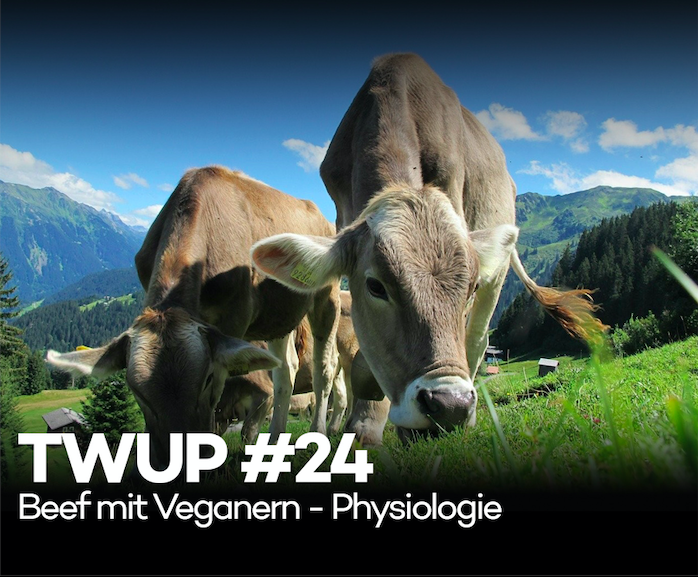Die vegane Ernährung ist präsenter als je zuvor. Obwohl Wolfgang grundsätzlich keine vegane Ernährung empfiehlt, sieht er einige Vorteile in einer veganen Ernährung. Diese Episode beleuchtet jedoch nicht die Vor- und Nachteile einer veganen Ernährung. Sondern die häufigsten Aussagen mit denen eine vegane Ernährung aus ernährungsphysiologischer Sicht propagiert wird.
Diese Episode anhören über Spotify, Apple Podcasts, Deezer und Podigee
Referenzen:
The Journal of Nutrition. Volume 133, Issue 11. The Critical Role Played by Animal Source Foods in Human (Homo) Evolution. https://academic.oup.com/jn/article/133/11/3886S/4818038
Impact of meat and Lower Palaeolithic food processing techniques on chewing in humans https://www.nature.com/articles/nature16990
Origins of the Human Predatory Pattern: The Transition to Large-Animal Exploitation by Early Hominins https://www.journals.uchicago.edu/doi/abs/10.1086/701477
Science. 1999 Apr 23. Environment and behavior of 2.5-million-year-old Bouri hominids. https://www.ncbi.nlm.nih.gov/pubmed/10213682/
Serum concentrations of vitamin B12 and folate in British male omnivores, vegetarians, and vegans: results from a cross-sectional analysis of the EPIC-Oxford cohort study https://www.ncbi.nlm.nih.gov/pmc/articles/PMC2933506/?tool=pubmed
Vitamin B-12 status, particularly holotranscobalamin II and methylmalonic acid concentrations, and hyperhomocysteinemia in vegetarians. https://www.ncbi.nlm.nih.gov/pubmed/12816782
Effect of creatine supplementation and a lacto-ovo-vegetarian diet on muscle creatine concentration. https://www.ncbi.nlm.nih.gov/pubmed/12432177
Vegan diets: practical advice for athletes and exercisers https://www.ncbi.nlm.nih.gov/pmc/articles/PMC5598028/
Taurine concentrations in the diet, plasma, urine and breast milk of vegans compared with omnivores. https://www.ncbi.nlm.nih.gov/pubmed/3676193/
Taurine: a conditionally essential amino acid in humans? An overview in health and disease. https://www.ncbi.nlm.nih.gov/pubmed/12514918/
Plasma concentrations and intakes of amino acids in male meat-eaters, fish-eaters, vegetarians and vegans: a cross-sectional analysis in the EPIC-Oxford cohort https://www.ncbi.nlm.nih.gov/pmc/articles/PMC4705437/
Vitamin B1, B2 and B6 status of vegetarians. https://www.ncbi.nlm.nih.gov/pubmed/1797957
Dietary Reference Intakes for Vitamin A, Vitamin K, Arsenic, Boron, Chromium, Copper, Iodine, Iron, Manganese, Molybdenum, Nickel, Silicon, Vanadium, and Zinc. https://www.ncbi.nlm.nih.gov/pubmed/25057538/
Effect of vegetarian diets on zinc status: a systematic review and meta-analysis of studies in humans. https://www.ncbi.nlm.nih.gov/pubmed/23595983
Is iron and zinc nutrition a concern for vegetarian infants and young children in industrialized countries? https://www.ncbi.nlm.nih.gov/pubmed/24871479
EPIC-Oxford: lifestyle characteristics and nutrient intakes in a cohort of 33 883 meat-eaters and 31 546 non meat-eaters in the UK. https://www.ncbi.nlm.nih.gov/pubmed/12740075/
Dietary iron intake and iron status of German female vegans: results of the German vegan study. https://www.ncbi.nlm.nih.gov/pubmed/14988640/
Iron-deficiency anemia. https://www.ncbi.nlm.nih.gov/pubmed/25946282/
Nutrient intake and iron status of Australian male vegetarians. https://www.ncbi.nlm.nih.gov/pubmed/10201799
Nutrient intake and haematological status of vegetarians and age-sex matched omnivores. https://www.ncbi.nlm.nih.gov/pubmed/7956998

